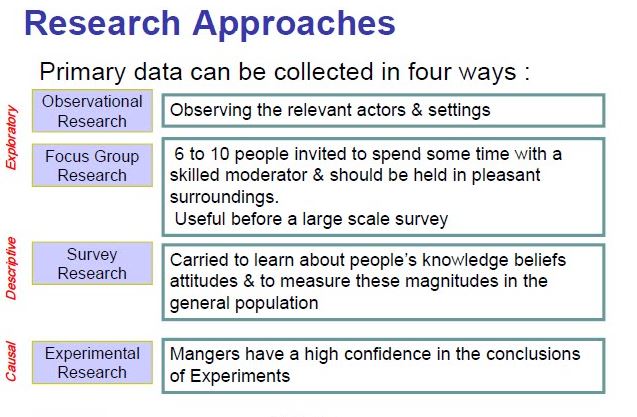Qualitative or Quantitative?
Approaches for all research, whether qualitative or quantitative, requires interpretation and contextualization by the researcher. Narrative statements or a series of figures will not give the answer to the research question or statement (hypothesis) by themselves.
Therefore it is important to choose a research approach (or approaches) that will give the correct ‘type’ of data to answer your research question.
A number of approaches are available when gathering data, but these don’t have to be used in isolation. For instance a focus group can elicit viewpoints which may need exploring further will a larger research cohort using a closed question survey. For this reason, it is important to plan your approach thoroughly before you start, to ensure your research question can be answered and to let your respondees know what is expected of them.
Don’t forget that whichever research method is chosen, it needs to have a robust ethics form that has been approved before contacting participants and starting to gather data.
Approaches that can be used:
Focus groups
This is where a group of people discuss a particular problem, facilitated by the researcher. The group interaction and the sharing of ideas not only means that rich and meaningful data can be pulled out from the focus group but also during the course of the focus groups, ideas can be co-constructed between participants which can be used to further the depth of research.
Structured interviews
When using structured interviews, the questions are written beforehand and are strictly adhered to regardless of the answer.
Semi-structured interviews
Whilst pre written questions are also used in semi structured interviews, this approach allows for the researcher to spontaneously build on answers given, allowing the base question to be answered but also elaborating on any areas which may impact on the research answer.
Survey
Surveys are an excellent way to reach a large number of people. This approach works if there is a clear idea of the questions that will elicit research to support the hypothesis. A mix of qualitative (open text fields) or quantitative (set questions and answers) can be used.
Case study
This approach is valuable when more in depth research is required and allows the researcher to investigate the issues in the place or time that they occur. The researcher will observe the participant and often will have follow up meetings to clarify or build on the information gained.
Narrative enquiry
This method works on the ideology that it is less important what is said, then how it is said. The story a participant will tell may not be entirely factual but it will be their perception of what happened which gives greater in sight. This approach is linked to discourse analysis methodology.
Appreciative enquiry (AI)
AI shifts the traditional focus of looking for the negative impacts of an issue and instead approaches the issue from a positive perspective.
Ethnographic
Ethnographical methodology requires the researcher to embed themselves in the participatory groups own setting, for a sustained time in order to observe, talk and learn from participants.
There are a number of branches from the ethnographic methodology:
Auto ethnographic
More than just an autobiographical account, an auto-ethnographic researcher should reflect on events and use these to uncover meanings and feelings that a purely narrative account may miss.
Visual ethnographic
Using video, photos and artefacts as the main source of research data rather than supplementing it.
Netography
Researchers using this methodology are involved and participants or ‘lurkers’ in virtual groups and communities. Ethical issues need to be carefully considered with this approach.
Soft Systems Methodology (SSM)
Instead of studying isolated issues, SSM is a holistic way of looking at and solving problems. These are often presented in mind map formats, making this a good research methodology for visual learners.
Questions to ask before choosing a research approach:
- Will we learn more about this topic using quantitative or qualitative approaches?
- Which approach will produce more useful knowledge?
- Which will do more good?
References
Taken from: Cousin. Glynis, (2009) Researching Learning in Higher Education. Routledge. UK.

Relevant Blog Posts
Research Methods
Perfect Research
Dissertation Help
If you enjoyed reading this post on approaches for research dissertations, I would be very grateful if you could help spread this knowledge by emailing this post to a friend, or sharing it on Twitter or Facebook. Thank you.
